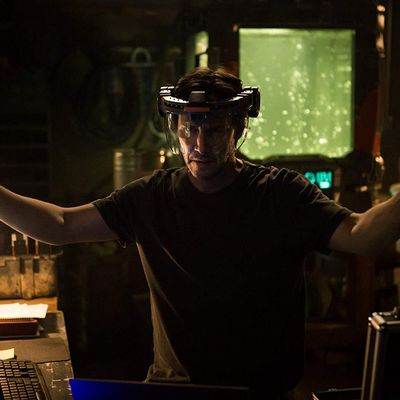
I guess it’s encouraging that we’ve reached a place in sci-fi where utter bullshit just doesn’t fly anymore. Unlike in, say, political discourse, there actually seems to be a limit to how far you can stretch scientific truth before an idea becomes unviable. Maybe we’ve been spoiled by a string of comparatively technically rigorous space dramas, maybe close-to-home speculative fiction like Black Mirror has made us want to engage more with what could actually be. In any case, while the nature of consciousness and the displacement of the self continues to be a subject of fascination in our everywhere-and-nowhere times, I think it’s pretty safe to say that Replicas is not going to scratch that itch.
It’s a concept that should sound very familiar: Neuroscientist Will Foster (Keanu Reeves) is working on transferring consciousness from a human brains to synthetic ones, and when he loses his entire family in a car crash, it ends up being the perfect opportunity to test his discoveries. With the help of his own personal Igor, Ed (Thomas Middleditch), he downloads his dead family’s brains onto hard drives, grows clones of them in his basement, then maps the neural information onto their new smooth clone brains. We’ve seen his previous experiments mapping onto robot brains go unintentionally hilariously awry — the consciousness of a recent killed veteran is plopped into an I, Robot type android, and promptly starts screaming “WHO AM I” and rips its own face off, something I think the kids today would call a “big mood.” But when the Foster family awakens — at, uh, about an hour into the running time, you’ve been warned — the transfer seems more or less successful. Will Foster has revived his family — but at what cost???
Well, the first cost is obvious, and so contrived that its would-be philosophical quandary is rendered a total joke. You see, Ed only has three pods for clone-growing — and Will has a wife (Alice Eve) and three kids to revive. After fruitlessly yelling at his assistant that “we need more pods!” we see the implications of this extremely screenwritten Sophie’s Choice dawn on him, and cut to him tearfully writing his family’s names on scraps of paper and putting them into a bowl. And so on. Replicas is chock-full of histrionic what-ifs that seem to hyperventilate so hard in their delivery that they don’t have enough oxygen to actually blow anyone’s mind. It would be the stuff of future cult screenings if it wasn’t so boring and muddled.
When the family finally emerges from their protein baths and Will wakes up to find them eating breakfast in the kitchen like nothing ever happened, it starts to feel as if things might get going, that the film might actually get a little freaky. Eve’s character (or the clone of her, anyway) goes for a jog and then slows down, wincing at some internal strangeness. I braced myself for the body-horror portion of this microwaved genre TV dinner, as it would at least be something different to pass the time. But it never arrives, and the primary difficulty of Will’s life with his new cloned family is not that they are a cloned family but that they are technically property of the biotech company he works for, and the company wants to destroy them.
It then becomes clear why it takes Replicas so long to get to the actual living-with-clones part, because it was never about living with clones, and always about the logistical and bureaucratic difficulties of growing a family of clones in your basement. The film slows down for circa-2004 money shots of Will’s Minority Report–esque brain-mapping interface, and speeds through Eve’s character’s realization that she has died and is now a clone, which amounts to a furrowed brow and a disapproving shake of the head. The least they could have given her was a moment as grandiose as that android with the identity crisis — but it’s clear that human emotions, even the campy absurd variety, are not something in Replicas’ protein pod.

